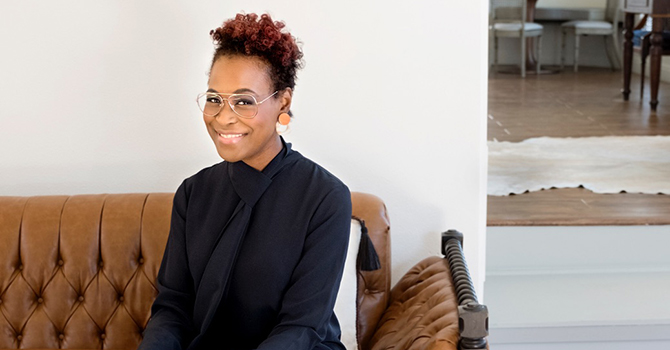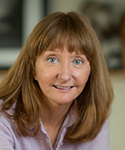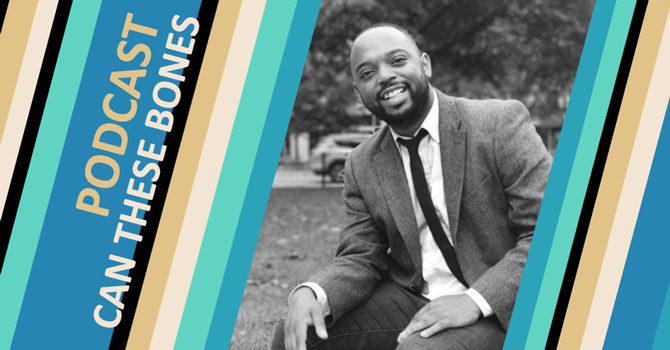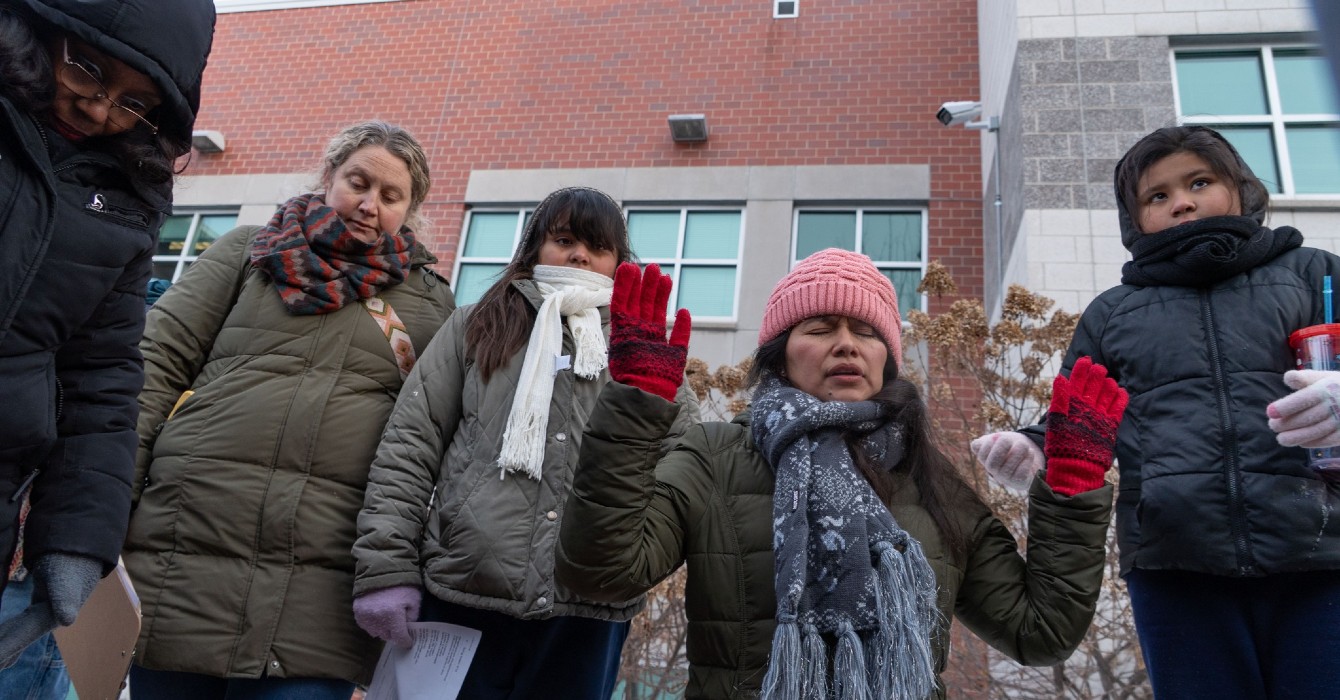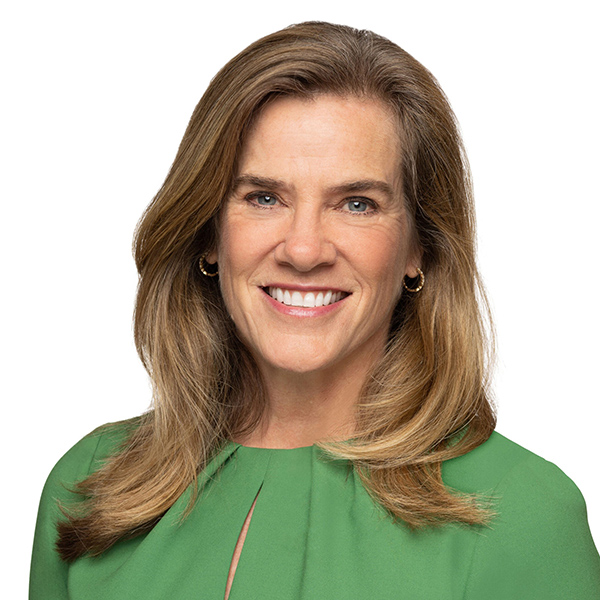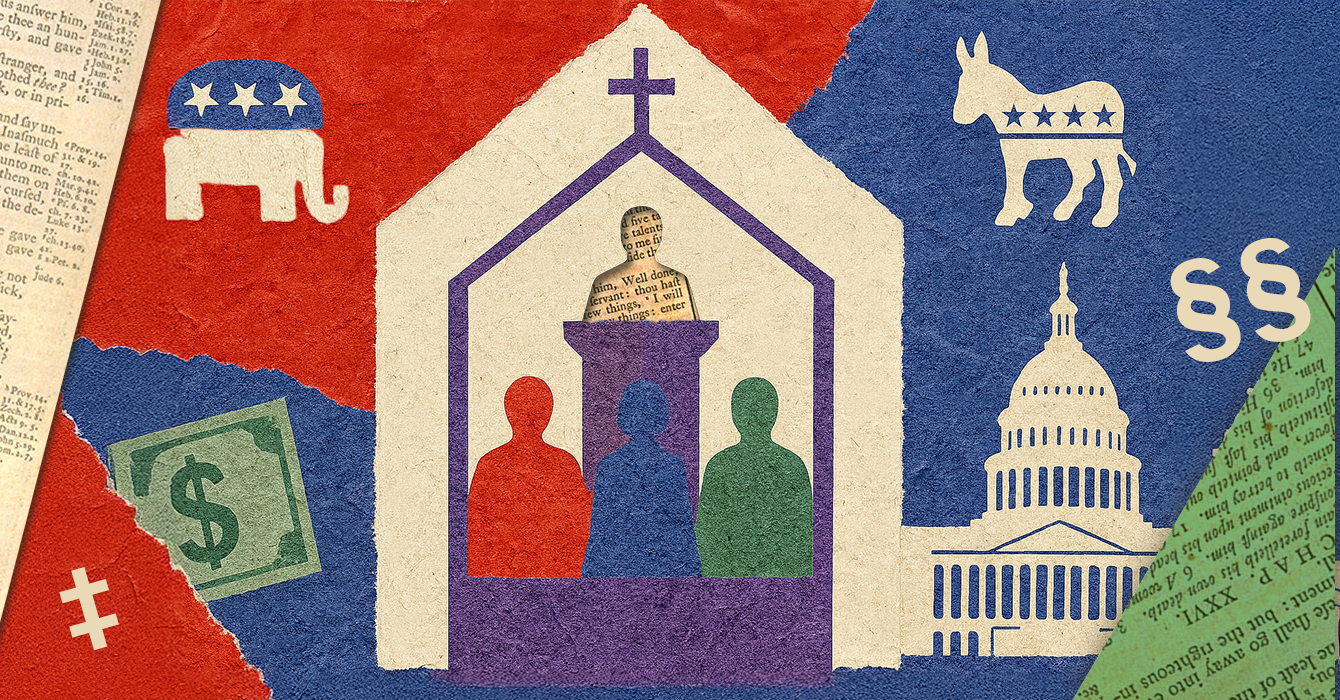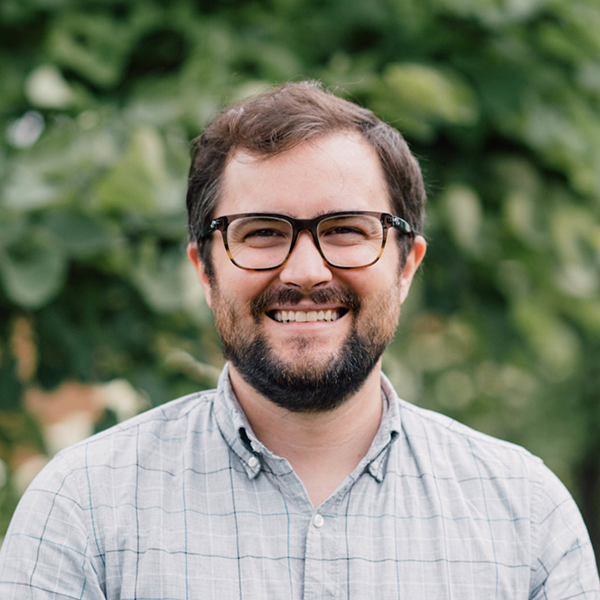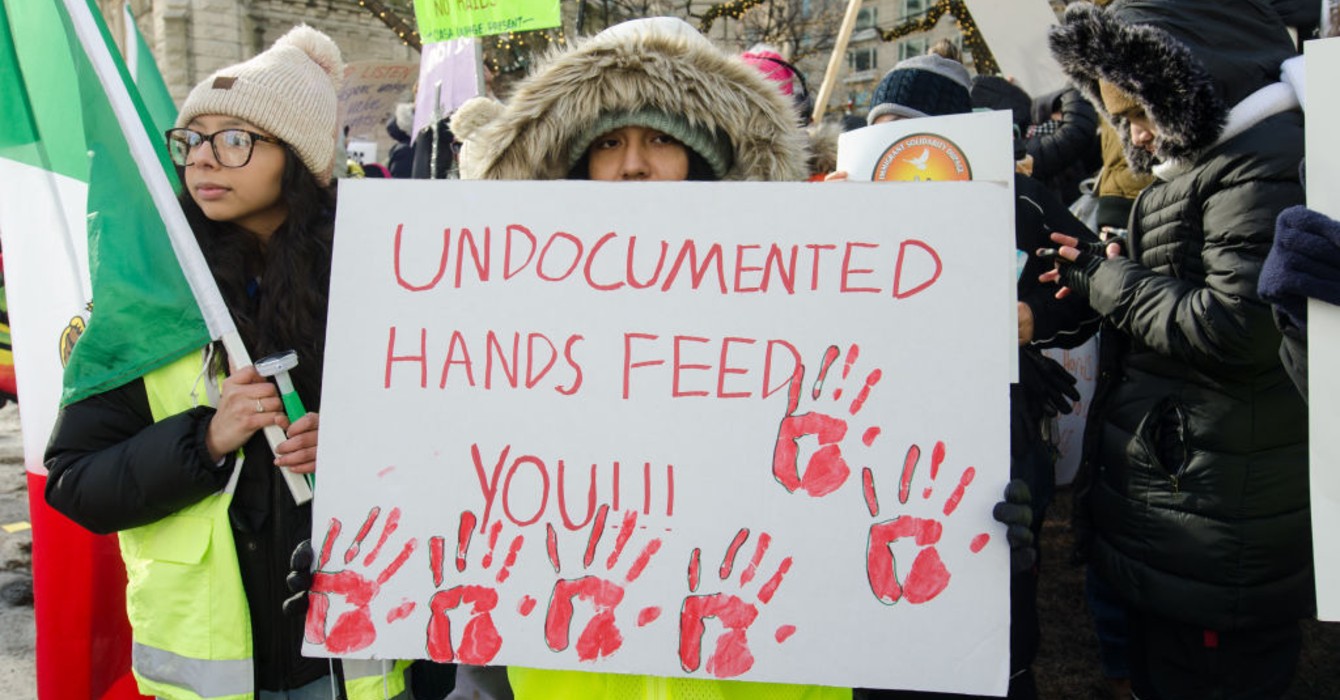The Black church and its legacy of political engagement form an inseparable history. Many Americans’ view of the church and its membership, however, is merely as an October news backdrop for a white candidate’s high-visibility preelection visit for a Sunday service.
Errin Haines sees through the lens of lived experience, both growing up in Atlanta churches and then working as a local reporter. Later at The Washington Post and The Associated Press, she wanted her coverage to reflect the voices and issues raised by those in church communities, including mission-driven women.
The nation has begun to recognize what Haines has long centered: the crucial role of Black women in the political landscape, many engaging as a facet of faith.
This year has been pivotal for Haines, too. She left her job as the AP national writer on race to join the new online newsroom The 19th*. The publication, named for the constitutional amendment granting U.S. women suffrage, focuses on “the intersection of gender, politics and policy.”
The asterisk in the name was Haines’ idea, recognizing Black women’s continued disenfranchisement after the amendment’s passage.
“What we have an opportunity to do with this conversation is talk about how not just my faith but how the faith, race and gender intersection informs my reporting. I feel like it has -- being a Black woman, being a Southerner, being from Atlanta, the cradle of the civil rights movement, with its grounding in the Black church,” said Haines, also a regular MSNBC contributor. “My work involves seeing those voters through that lens.”
It was Haines who first brought the Louisville police shooting of Breonna Taylor to national attention earlier this year.
In an interview with writer Ellen Ann Fentress, Haines discussed how her faith intersects with her journalism. The following is an edited transcript.
Ellen Ann Fentress: How do your beliefs in God relate to your goals professionally?
Errin Haines: I do believe reporting on race, which is what I’ve done for much of my career, is a calling for me in terms of the journalism I wanted to do, the idea of bearing witness on behalf of my race and knowing the history of the race and how tied it is to faith and to my faith. My faith is part of my lived experience. It’s not something that’s always right on the surface of my reporting, but I think it helps make me a better reporter.
EAF: People without your experience don’t necessarily understand the fusion.
EH: That is what I found myself doing, even in the early stages of my career, because we know the civil rights movement was so tied to the Black church, right? Martin Luther King co-founded the Southern Christian Leadership Conference. “A battle for the soul of America” is not something Joe Biden invented. That [goes back to] the motto of the SCLC.
Being able to recognize those things culturally and not just from a religious perspective is extremely helpful. I can remember covering the Charleston Nine shooting and understanding the dynamics specifically of the African Methodist Episcopal Church. A lot of white reporters who covered, for instance, the Rev. [Clementa] Pinckney’s funeral didn’t really know what was happening the whole time.
I live in Philadelphia now, the birthplace of the AME church. I’ve learned more about Richard Allen and his story. It’s perfectly in line with what I believe as a Black person in America, and it is in line with the kind of journalism I do. I feel like the work that I’m doing is about ushering in a more free and fair America, which is what the Black church has always been about as well.
Black people, when they were enslaved, took this religion and turned it into something that was liberating instead of a tool to continue to oppress them. It’s radical and it’s revolutionary, and it absolutely informs my approach.
EAF: It’s the opposite of what I grew up with in the conservative white church in Mississippi. So many churches were complicit with segregation and anti-civil rights, saying, “We’re not going to get involved in politics.”
EH: As much as we talk about white evangelicals, what would their guiding spiritual or scriptural tenet be? When I think about the Black church, I think about Hebrews 11:1 -- “Now faith is the substance of things hoped for, the evidence of things not seen.” That’s the story of Black America. I don’t know what that is for white people.
EAF: There’s a great quote in Joe Crespino’s book “In Search of Another Country” from a woman doing civil rights work in Greenville, Mississippi, in the 1960s. She said she didn’t think, for white people, their god was God. She thought their true god was maintaining the status quo.
EH: It’s a religion of white supremacy, right? That is the thing that you actually worshipped, because to read the Bible and to understand what Christianity is supposed to be, to turn around and make choices many white Americans have made for centuries -- it’s hypocritical.
EAF: You personally have so much going on now.
EH: I’m glad to do this conversation, because it’s important. Having a healthy spiritual life is a huge part of [self-care], especially for Black journalists right now, with everything we are covering and everything we’re up against as part of Black America.
My faith helps keep me grounded in the work I’m doing, and why I’m doing it and who I’m doing it for, and bearing witness for people. My faith helps me to navigate all of that, so being as strong as I can be spiritually helps make me a better journalist.
EAF: With George Floyd’s death, was there just a point where there was a huge spiritual need inside you, considering what you’ve witnessed?
EH: I’m covering these stories as a reporter, but as a Black person, does it occur to me to pray for these people’s families? Of course, yes. Do I process those things also from a faith perspective? I think I do, outside of just the work of writing about it or talking about it.
EAF: How does your intent to cover the intersection of race, gender and political power relate to your spiritual life?
EH: My faith gives me a language to have those kinds of conversations and to be thinking about Black voters in that way and to see stories other people may not or cannot see because they haven’t had that experience, or if they have had it, it’s not that important to them personally.
EAF: You’ve talked about how important the experience of the Black woman was going to be to the election.
EH: So many of these Black women are women of faith, right? I think about LaTosha Brown, co-founder of Black Voters Matter. This woman, her reservoir of faith, it seems fathomless. Even with all she has been up against and all that she’s been trying to do, you can tell that her faith is absolutely central to her politics.
Not everybody who will be covering her would center that or understand what they were looking at. She’s in the tradition of people like Fannie Lou Hamer, who absolutely was spiritual. And Stacey Abrams, voter suppression. She feels like she’s on a divine assignment to address this, and hearing her say that, and recognizing that, that can lead to different kinds of conversations.
EAF: How come people assume Christians are white evangelicals? Why not Christians as progressives? That’s been the history of Black women forever.
EH: The Rev. Martin Luther King pointed out, frankly, when we talk about evangelicals, we’re talking about white evangelicals, period. They assume Black people’s faith does not factor into the politics or that it’s not an important thing to mention until we get to conversations about Souls to the Polls or, “Oh, a Democratic candidate or a Republican candidate is coming to this famous Black church.”
Talk to Black voters all year round. You can go to a Black church and say, “What are your concerns?” For Black voters, their faith and their politics are intertwined.
You may not have a Black pastor in the pulpit telling somebody who to vote for, but they will absolutely be telling that congregation about how important it is to vote -- “We will give you a ride if you need one. We will make sure you have your voter registration.”
I know Black churches right now collecting PPE for their church members to stand in line at the precinct. That’s an extension of faith for them.
EAF: Has the intersection of your spiritual life and your professional life evolved?
EH: I’m more aware of it. Philadelphia has given me this amazing new appreciation and awe of the AME tradition. It is a spiritual experience, regardless of your denomination, to go to Mother Bethel and see this structure built by formerly enslaved people right down to the pews; you know those were the hands that made those.
You get to sit in them. You get to worship in the same place as those people who were not even a generation out of bondage. It’s remarkable to think about the struggle and the faith those people had. The story of Black people in this country, that kind of experience -- it’s recharging. It is affirming, and it sends you back out into the world feeling like you can do this work.
EAF: Everything you’ve thought about the role of Black women in the U.S. is being proved in a bigger way every day.
EH: I’ve spent so much of my career covering the civil rights movement and that legacy; to hear about their stories was really to hear testimonies of faith over and over again. You can’t separate it, no, and these women didn’t separate it.
EAF: You are a woman of color in the spotlight. Talk about that in terms of your goal for the work. You’re everywhere.
EH: That’s why I really wanted to have this conversation with you. Because I do think it’s important for me, because I have this platform, to talk about my faith in public. My Twitter bio has a scripture in it. I’m not ashamed of that.
I want people to know that I do feel by doing this work that I’m living the purpose God has for my life and that I absolutely see this as -- like everything, my talent and ability but also all my accomplishments are God given. Any time or place I have a chance to say that, I’m going to say it.
EAF: You’ve been put here like Esther in the Old Testament. False humility does not serve God.
EH: It’s not about me; God is using me. I’m a vessel to tell these stories to bring about the beloved community in America. That approach to journalism is not something that necessarily fits in with notions of objectivity, but if the Fourth Estate is a central part of this democracy, then what do we want this democracy to be? What are the values that inform that?
I think some of the core beliefs of the Black church and what the Black church has been pushing for and working for for so long cannot be divorced from that.
EAF: Are you seeing hope that the Black church’s imprint is becoming more central?
EH: Like the conversation the Rev. William Barber has forced in the past several years, forcing poverty onto the agenda, and the conversation this election cycle -- he is a moral voice in American politics. Why not elevate this man in a way that you would give a platform to white evangelical leaders?
EAF: The Biden campaign, his convention speech opener quoting Ella Baker -- much about the convention centered Black women.
EH: Joe Biden’s faith also is central to who he is, and so that is probably something that’s going to have to come up. They talk about his empathy or the tragedy that he’s faced in his life. No. That is tied to his faith and how he has gotten through life by leaning on that faith.
To have a person of faith looking at that story or telling that story probably sounds very different. Redemption, faith -- it’s not just about grief.
EAF: If you see yourself as having a call to your work, could you talk about how the call came?
EH: It was reinforced for me. When I was a younger -- my beginning in journalism started at the Atlanta Daily World in the Sweet Auburn neighborhood. There are a lot of historic Black churches in that area, Ebenezer being one of them, obviously, the spiritual home of Martin Luther King Jr., but also all of these churches. Most of the civil rights leaders I covered were pastors -- Andrew Young, Joseph Lowery.
I covered race for five or six years and found myself getting worn down. I thought maybe I wanted to cover something else, which is how I started covering politics, honestly.
I covered the Georgia Legislature wanting a break from covering basically racism, but you know what happened? I got to the Legislature and I started seeing social issues popping up again, and Black lawmakers trying to confront these things. I was like, “Well, clearly, I’m not going to get away from covering race here either; the Legislature is also racial and political.”
What that told me was, “No, Errin. You actually are supposed to be doing this work. This is why God put you in journalism, so that you could tell these stories and bring the totality of your lived experience to this work.”
That was around 2010-ish. I was like, “You should not run away from this coverage, because this is what you were actually meant to do.” I went at it full speed.
Even now, my decision to leave what I thought was my dream job and the plan God had for me, to be the national writer on race for The Associated Press -- I look at that now, and I realize that was an assignment. I did it.
This is my new assignment, to cover race and gender in politics, but also to be a voice of clarity about who and where we are as a country through journalism, because Black women and Black women of faith are a voice of clarity about America. I’m in that tradition.
EAF: Paula Giddings has that great point in “When and Where I Enter” about how individual Black women have inspirational stories but it disempowers the legacy to see them as separate stories instead of a united grand history.
EH: Exactly. To talk about the Black experience on a continuum is to understand the history and to understand the history of Black people, which you cannot understand without understanding the history of the Black church.

